SECOND FDC DIALOGUE FORUM-2012
“REGIONAL CONTRIBUTIONS TO THE CODIFICATION OF THE RIGHT TO PEACE”
Geneva, 6 June 2012 Palais des Nations 11:15 – 13:15 Room XXI
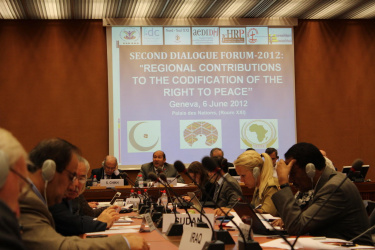
1. Introduction. 2. Presentations. 3. Debate. 4. Closure. Annex 1: list of attendance
1. Introduction.
The Human Rights Council (HRC) is an inter-governmental body reporting to the General Assembly and made up of 47 States responsible for strengthening the promotion and protection of human rights around the globe. The GA established the HR Council on 15 March 2006 with the additional purpose of developing the international human rights law.
In preparation of the 20th regular session of the Human Rights Council, the 2nd Dialogue Forum in 2012 focused on the Regional contributions to the Codification of the Right to Peace was held on 6 June 2012 at the Palais des Nations (Geneva). It was jointly organized by the Foundation for Dialogue among Civilizations (FDC), the Spanish Society for International Human Rights Law (SSIHRL), the International Observatory of the Human Right to Peace (IOHRP), the World Council of Churches (WCC), Nord-Sud XXI, Rencontre Africaine pour la Défense des Droits de l'Homme (RADDHO), the Japanese Committee on the Human Right to Peace and the International Association of Peace Messenger Cities. It was also co-sponsored by the Group of the Non-Aligned Movement (NAM), the Organisation of the Islamic Cooperation (OIC) and the African Group (AG).
The Forum was the Second of a series of meetings on the right to peace organised by CSO in coordination with regional groups. The first Forum -focused on the Contributions of the Islamic World to the Right to Peace- was co-organised by the Organisation of Islamic Cooperation (OIC), the Foundation for Dialogue among Civilizations (FDC), the Spanish Society for International Human Rights Law (SSIHRL) and the International Observatory of the Human Right to Peace (IOHRP) and took place in the Palais des Nations on 14 March 2012.
The main objectives of the Second FDC Dialogue Forum-2012, were the following:
- To share the Santiago Declaration on the Human Right to Peace with regional groups;
- To introduce the Statutes of the International Observatory of the Human Right to Peace and extend an invitation to African and Asian civil society organizations to join the General Assembly of the Observatory;
- To examine the ongoing codification process of the right to peace at the Human Rights Council and its Advisory Committee;
- To study actions to be taken by the HR Council at its 20º session, and in particular the establishment of an open-ended working group on standard-setting on the right to peace;
- To analyze the regional contributions to the right to peace provided by the regional groups, namely: Latin American and Caribbean Group, Organization of the Islamic Cooperation, African and Asian Groups;
- To examine the impact of the international peace movement in the promotion and strengthening of the human right to peace;
The Second FDC Dialogue Forum's working languages were English, Spanish and French. Simultaneous interpretation was provided.
Under the sound moderation of Mr. Ricardo Espinosa, Chief, Non-governmental liaison Unit, United Nations Office at Geneva, the following speakers analysed the regional contributions to the codification of the right to peace:
- H. E. Ambassador Hisham Badr, Permanent Representative of the Arab Republic of Egypt to the United Nations in Geneva and Coordinator of the Group of the Non-Aligned Movement (NAM) at the Human Rights Council;
- H.E. Ambassador Rodolfo Reyes Rodríguez, Permanent Representative of Cuba to the United Nations in Geneva and Coordinator of the Group of Latin America and Caribbean States (GRULAC) at the Human Rights Council;
- H.E. Ambassador Slimane Chikh, Permanent Observer of the Organization of the Islamic Cooperation (OIC) to the United Nations in Geneva;
- Prof. Carlos Villán Durán, President of the Spanish Society for International Human Rights Law and representative of the International Observatory of the Human Right to Peace.
In addition, the following CSO representatives briefed the audience on the regional approaches to the progressive development of the right to peace:
- Ms. Gala Maric, Nord-Sud XXI
- Mr. Yorio Shiokawa, Japanese Committee on the Human Right to Peace
- Mr. Biro Diawarago, Rencontre Africaine de Défense Pour les Droits de l'Homme
The meeting was attended by some 77 peoples, including representatives of Member States and International Organisations such as Angola, Algeria, Arab Republic of Egypt, Arabia Saudi, Argentina, Bangladesh, Bolivia, Brazil, Congo, Cote d'Ivoire, Cuba, Cyprus, Ethiopia, Ecuador, Holy See, Hungary, India, Indonesia, Iran, Iraq, Italy, Japan, Libya, Mexico, Morocco, Nepal, Pakistan, Qatar, Romania, Senegal, South Africa, Spain, Sudan, Tunisia, Turkey, Uruguay, United States of America, Venezuela, Vietnam, Organization of the Islamic Cooperation, Non-governmental liaison Unit of the United Nations Office at Geneva, UNDP and UN University for Peace.
In addition, the following 21 CSO attended the meeting: the Japanese Committee on the Human Right to Peace, International Association of Democratic Lawyers, Planetary Association for Clean Energy, Foundation for Dialogue among Civilizations, Institute for Planetary Synthesis, International Association of Peace Messenger Cities, Spanish Society for International Human Rights Law, The International Observatory of the Human Right to Peace, ISEO and CMDC, Kennedy Centre for International Studies, Rencontre Africaine de Défense des Droits de l'Homme, Nord-Sud XXI, International Fellowship of Reconciliation, Al-Hakim Foundation, Worldwide Organisation for Women, Non-Violent Peace-Force, Inter African Committee on Traditional Practices, FEMMET, CAPSDH and Associazione Comunita Papa Giovanni XXIII.
All speakers congratulated the organizers for this initiative gathering together both representatives of States and CSO in the promotion of the right to peace at the United Nations. In particular, they expressed full support to the codification process of the right to peace; they welcome the (third) draft Declaration on the right to peace prepared by the Advisory Committee and the crucial contribution of CSO in this field.
Both representatives of States and CSO also requested the HR Council at its 20th forthcoming session to establish an open-ended working group to continue the codification process of the right to peace taking duly into account both the AC draft Declaration and the CSO main contribution, i.e. the Santiago Declaration on the Human Right to Peace, adopted on 10 December 2010.
Finally, the speakers congratulated the coordinators of the Second FDC Dialogue Forum-2012, for there outstanding dedication to the overall organization and the success of the meeting.
Participants were provided with a concept paper on the "Regional contributions to the codification of the right to peace" coming from UN bodies and CSO from the Latin American and Caribbean States, the Islamic world, Europe, Africa and Asia. All UN regional groups showed commitment to promote international peace and security, including the right to peace.
2. Presentations
The Moderator, Mr. Ricardo Espinosa, Chief, Non-governmental liaison Unit, United Nations Office at Geneva, opened the Second Dialogue Forum by acknowledging the role played by the CSO in the organisation of this meeting and the co-sponsorship of the Group of the Non-Aligned Movement (NAM), the Organisation of the Islamic Cooperation (OIC) and the African Group (AG). In addition, he referred to the main objectives of the Second Forum, in particular actions to be taken by the HR Council at its 20º session such as the establishment of an open-ended working group on standard-setting on the right to peace.
Next, H. E. Ambassador Hisham Badr, Permanent Representative of the Arab Republic of Egypt to the United Nations in Geneva and Chairperson of the Group of the Non-Aligned Movement (NAM) at the Human Rights Council, welcome the participants saying Salamo Aleikom or “peace be upon you”. It is the salutation of Islam and it is no different in other religions. So, even in our diversity we share the culture of peace. And this is the message I would like to greet you with, he added.
In addition, he was pleased, in his capacity as Chair of NAM in Geneva, to participate in this timely event organised by a host of civil society organisations and co-sponsored by NAM, the OIC, and the African Group. He hailed the diligence and commitment of the representatives of civil society organisations who incessantly promoted the right to peace. He also acknowledged the leadership demonstrated by Cuba in formalising such efforts within the field of the Human Rights Council, paving the way for the consideration of the AC draft declaration on the right to peace. In ten more days the 20th session of the Human Rights Council is to start and action will be taken on the AC draft declaration.
The speaker also stated that peace is not only the absence of war or conflict, but rather more profound requiring certain conditions and vehicles to achieve it. The attainment of peace goes beyond the negative obligation on states to refrain from resorting to the use of force, and carries more proactive/positive obligations. In addition, there are underlying notions that link up to the promotion and protection and realisation of human rights.
As much as peace is the absence of conflict or war, it is also the promotion of tolerance, understanding, dialogue, respect for diversity, and co-existence, which all act as tools for the prevention of the disruption or breach of peace. Peace is the respect for sovereignty and the sovereign equality of States, and the territorial integrity and non-intervention in the internal affairs of any State. It is also the due diligence and the fulfilment of international obligations towards the peaceful settlement of disputes. It entails refraining from the threat of and use of force. It is international cooperation and the adherence to friendly relations among States. All these are enshrined in and drawn from the purposes and principles of the UN Charter.
He also reminded that the main pillars of the United Nations are peace and security, development, and human rights, which are mutually reinforcing. Grasping this fact is conducive to the realization of the importance of peace to the promotion and protection of human rights. An atmosphere of peace is a prerequisite and condition for the realization of all human rights and fundamental freedoms for all. By the same token, the absence of peace necessarily leads to the erosion of those human rights to which we are bound and committed. As such, peace in and of itself becomes a right. It is the right of peoples to peace that embraces this holistic encompassing enabling environment for human rights.
Early on, the Non-Aligned Movement has realised this fact. The raison d’être of the Movement itself was the attainment of peace. The NAM came to being from a desire harboured by its member countries to maintain a non-aligned position during the cold war, with a commitment towards the attainment of world peace and security and development. Hence, the NAM, by the sheer size of its membership reaching up to 120 member states, which falls short only of the United Nations, is the world’s largest forum for the promotion of peace.
As the lingering shadows of the devastating impacts of the two world wars fade away, it is timely and incumbent upon us to alert current and future generations to the importance of maintaining peace and to underline the relevance of the lessons learned from those horrible human experiences. The existence of peace should not be taken for granted but has to be worked for.
As stated by the speaker, realising this responsibility, the NAM’s founding principles include the requisite elements for the attainment of peace, most importantly the respect for fundamental human rights and for the purposes and principles of the UN Charter; respect for the sovereignty and territorial integrity of all nations; recognition of the equality of all races and nations; abstention from intervention or interference in the internal affairs of states; refraining from acts or threats of aggression or the use of force; and the peaceful settlement of disputes.
At its 14th summit, the Movement renewed its commitment to those principles and adopted ‘the principles enshrined in the Declaration on the Purposes and Principles and the Role of the Non-Aligned Movement in the Present International Juncture’. Through those principles the NAM is committed to, inter alia, the promotion of a dialogue among peoples, civilisations, cultures and religions; the effective implementation of the right of peoples to peace and development; condemnation of genocide, war crimes, crimes against humanity and systematic and gross violations of human rights; rejection of and opposition to terrorism; promotion of multilateralism; and respect for the political, economic, social and cultural diversity of countries and peoples.
Close analysis of those principles makes us realise how far the NAM has been able to adapt itself to international developments and changing global environment, including emerging requirements for world peace, couched in human rights language as the right of peoples to peace.
The speaker concluded that there is no denying the fact that ours is a globalised world. There is also no denying the fact that this globalisation does not mean hegemonization. We still and will always have diverse cultures, religions, political, economic and social systems. A sound management of this diversity leads to a sound management of globalisation. NAM ministers lately met in Sharm El-Sheikh where they reaffirmed that ‘tolerance, mutual understanding and respect are fundamental values of international relations and that cultural diversity and the pursuit of cultural development by all peoples and nations are sources of mutual enrichment for the cultural life of humankind’. It is through those ideals and the proper adherence and implementation of all dialogue among civilizations that we can achieve ‘peace’ and guarantee the enjoyment by all peoples of their right to peace. Building on the above, we are on our path to identifying the core elements by which we can define and formalize the right of peoples to peace.
Next, H.E. Ambassador Rodolfo Reyes Rodríguez, Permanent Representative of Cuba to the United Nations in Geneva and Coordinator of the Group of Latin America and Caribbean States (GRULAC) at the Human Rights Council, welcomed the close collaboration among four regional groups –GRULAC, NAM, OIC and African Group- and CSO in the progressive development of the right to peace. In addition, he was very happy by sharing this panel with the Chairperson of NAM and seeing European representatives attending the meeting.
According to the speaker, the history of the right to peace goes back to the resolution on the impact of depleted uranium bombs in the enjoyment of human rights adopted by the Sub-Commission on Human Rights. In this time we considered that the progressive development of this specific matter was a little difficult. For this reason, we brought our attention to the Declaration on the Right of Peoples to Peace adopted by the General Assembly in 1984. Therefore, we decided to present several resolutions on the right of peoples to peace at the Human Rights Council, which were adopted with a clear division between North and South.
During this legal and political process, the contribution of civil society, and in particular the SSIHRL, has been decisive in the implementation and progressive development of the right to peace. It follows that this important right is not actually limited only in the context of the relationship among States, but also individuals, organizations and groups. The right to peace is both an individual and collective right.
Although the international community had the Santiago Declaration on the Human Right to Peace as a reference document, it was strongly advisable to have an official document elaborated by an intergovernmental body. For this reason, the Human Rights Council requested the Advisory Committee to elaborate a first draft Declaration. While the original mandate of the Advisory Committee was to elaborate a draft Declaration on the right of peoples to peace, AC experts considered more appropriate to draft a Declaration on the right to peace in its double dimension, individual and collective.
In addition, the speaker informed that Cuba was preparing the next draft resolution on the right to peace to be submitted to the Human Rights Council in its 20º session (June 2012). It would be open to the contributions of all regional groups. The objective of this resolution is to establish an Open-Ended Working Group (OEWG) on the right to peace with the participation of all CSO. The main mandate of the OEWG shall be to prepare a draft Declaration on the right to peace to be submitted to the General Assembly for its final adoption.
The current priority in regards to the new resolution is to invite the developed countries to join the consensus, while developing countries have the majority of votes to adopt the draft resolution. Nevertheless, Cuba will be flexible in the negotiation process in order to incorporate the different viewpoints and sensibilities in the resolution. However, Cuba will not accept those positions whose purpose would be to block the progressive development of the right to peace.
Next, H.E. Ambassador Slimane Chikh, Permanent Observer of the Organization of the Islamic Cooperation (OIC) to the United Nations in Geneva, stated that in the OIC there was a great interest in participating in this meeting on the codification process of the right to peace. He expressed his sincere thanks to the SSIHRL which is coupled with admirable consistency to carry out the enterprise of a collective reflection on the right to peace. This was a long process which began in 2005 with the purpose of adopting a UN Universal Declaration on the Right to Peace.
The speaker stated that in the light of the long process of maturation of this project, a peace declaration is bound to be more laborious than a declaration of war. Despite human history is full of sound and fury, the tireless efforts of men of good will shall make success the logic of peace over the logic of war. To reach this aim, we need to support the efforts of persuasion aimed to overcoming the reluctance of states to release a portion of their sovereignty and accept the implementation of the responsibility to protect; the protection of the environment; the right to self-determination or the right to conscientious objection.
The effort of reflection enriched by contributions and successive inputs is based on the holistic concept of peace, which is not limited to the absence of war. The right to peace includes several collective and individual rights, namely: civil, political, economic, social and cultural rights. The right to peace makes a linkage between humanitarian law and the general international law and it is also connected with the rights to a healthy environment, disarmament and development.
The concept has evolved in its formulation from the right of peoples to peace to the human right to peace, until the right to peace. It includes several individual and collective rights. These fundamental right embodies the main values contained in the culture of peace. The right to peace is a factor of social cohesion and reconciliation among civilizations.
The OIC fully adheres to these values. At the occasion of our previous meeting held on 14 March 2012, focused was made in the contribution of the Islamic world to the right to peace, whose main ideas are the following:
- There exists a close relationship between Islam and peace (Salam). It recalls the Koranic precept which excludes compulsion in religion and encourages the peaceful dialogue with others;
- The OIC finds precisely its action plan in the OIC Charter, and in particular, in its preamble, which states that the main OIC objectives are to promote the high Islamic values of peace, compassion, tolerance, equality, justice and human dignity;
- The same Charter specifies in Article 2 paragraph 3 and 4 that "all Member States shall settle their disputes through peaceful means and refrain from use or threat of use of force in their relations" and that "all Member States undertake to respect national sovereignty, independence and territorial integrity of other Member States and shall refrain from interfering in the internal affairs of others". In addition, paragraph 5 states that "all Member States undertake to contribute to the maintenance of international peace and security and to refrain from interfering in each other’s internal affairs as enshrined in the present Charter, the Charter of the United Nations, international law and international humanitarian law";
- The humanitarian international law can also be found in the "Cairo Declaration on Human Rights in Islam", which was adopted on 5 August 1990 at the 19º conference of Ministers of Foreign Affairs;
- OIC is fully committed with the program of Action for a Culture of Peace adopted by the United Nations in 1999 and the Alliance of Civilizations whose first forum was held in Madrid in 2007;
- The decennial program of action adopted at the OIC Summit held on 8 December 2005 in Mecca called Member States to undertake in carrying out profound reforms in order to Meet the Challenges Facing the Muslim Ummah In The 21st Century; convert Islam in a religion of moderation, measurement and tolerance; condemn terrorism in all its forms and distinguish between terrorism and the legitimate resistance to the occupation.
- The OCI has mobilized to denounce islamophobia and promote the religious tolerance. The OIC efforts on this field had as result the adoption, by consensus, of the resolution 16/18 on 12 April 2011 by the Human Rights Council. It included the eight points of the statement prepared by the OIC Secretary General S. E. Ekmeleddin Ihsanoglu and prohibits discrimination based on religion or belief. Paragraph 9 of this resolution called the international community to "foster a global dialogue for the promotion of a culture of tolerance and peace at all levels, based on respect for human rights and diversity of religions and beliefs".
The OCI has translated these different principles in the field by deploying a large humanitarian action in favour of refugees, food aid and health, education, empowerment of women and economic development. OIC has also brought its attention in the field of conflict prevention, the preventive diplomacy and conflict resolution.
The codification of the right to peace must inspire concrete action on the field. The speaker made the following proposals:
- It is necessary to promote in the International Day of Peace (21 September) several initiatives such as the cessation of hostilities, the signature of peace treaties between belligerents, or the establishment of a group of reflection on peace matters;
- It should be recalled the Japanese example in the promotion of peace, whose Constitution recognises in Article 9 that "aspiring sincerely to an international peace based on justice and order, the Japanese people forever renounce war as a sovereign right of the nation and the threat or use of force as means of settling international disputes";
- It should be established a tax on arms sales whose proceeds should be used to finance the development.
Next, Prof. Carlos Villán Durán, President of the Spanish Society for International Human Rights Law and representative of the International Observatory of the Human Right to Peace, explained that pursuant to HR Council resolution 17/16 of 17 June 2011 and Advisory Committee (AC) recommendation 8/4 of 24 February 2012, the AC submitted to the HR Council its (third) draft declaration on the right to peace. The report stated that in the original mandate of the HR Council reference was made to “the right of peoples to peace”; the Advisory Committee proposed the term “right to peace”, which was found “to be more appropriate and includes both the individual and collective dimensions” (A/HRC/20/31, paragraph 6). In addition, the AC draft Declaration focuses on standards relating to international peace and security as core standards (elements of negative peace, absence of violence), and includes standards in the areas of peace education, development, the environment, and victims and vulnerable groups as elements of a positive peace” (paragraph 7).
In preparation of the 20th session of the HR Council, the Permanent Mission of the European Union (UE) in Geneva invited on 7 May 2012 the Deputy Permanent Representative of Costa Rica and the representative in Geneva of both the SSIHRL and the IOHRP, to brief the UE Member States on the on-going codification process of the right to peace at the UN. Today’s meeting is part of a series of meetings with regional groups, experts and CSO, which will be organized by the SSIHRL/IOHRP at the forthcoming 20th session of the Human Rights Council.
The Human Rights Council will also have before it a new joint written statement endorsed by 1,041 CSO and cities worldwide, in which they request the HR Council to welcome the AC draft Declaration and acknowledge the CSO contribution to the codification of human right to peace, i.e., the Santiago Declaration on the Human Right to Peace of 10 December 2010. CSO note with satisfaction that 85% of the legal standards originally proposed in the Santiago Declaration have been incorporated by the AC in its draft Declaration.
In addition, the CSO request the HR Council to establish an open-ended working group to continue the codification process of the human right to peace, taking duly into account all preparatory work. It shall meet during ten working days split in two sessions and would encourage a wide participation of CSO. The chairperson of the AC drafting group shall also be invited to take part.
Moreover, CSO invite the future working group to consider the following amendments to the AC draft Declaration on the right to peace in order to recover the 15% of the legal standards proposed by the Santiago Declaration, which were not accepted by the AC, namely:
1. The draft Declaration should be titled "human right to peace" to include minorities and humankind as additional right-holders of the right to peace;
2. The Preamble should be completed following the Preamble of the Santiago Declaration on the Human Right to Peace (2010) since it includes relevant universal and regional legal instruments providing background to the codification of the right to peace;
3. The concept of "right" should be added in the title of the articles 2 ("human security"), 3 ("disarmament"), 4 ("education and training in peace"), 5 ("disobedience and conscientious objection") and 9 ("development");
4. Article 3.3 should include an invitation to States to consider the establishment and promotion of Peace Zones and Nuclear Weapons Free Zones and to phase out progressively foreign military bases;
5. Article 5 should include the right not to participate in scientific research for the manufacture or development of arms of any kind; the right to oppose taxation for military expenditures; and the right to be protected in the effective exercise of the right to disobedience and conscientious objection;
6. Article 8 (peacekeeping) should add a new paragraph in the sense that all UN peace-keeping operations should integrate unarmed civilian forces to the appropriate protection of civilians.
7. Article 11 should be completed with specific reference to persons belonging to vulnerable groups such as persons arrested or detained and disappeared.
8. Article 12 should recognise the individual right to freedom of movement and to emigrate if his/her right to human security or to live in a safe and healthy environment, as stipulated in this Declaration, is seriously threatened.
9. Art. 13 should be titled "Obligations for the realization of the human right to peace" and completed in accordance with paragraph 4, 6, 7 and 8 of article 13 of the Santiago Declaration. And,
10. Article 13.6 ("implementation") should be replaced by articles 14 and 15 of the Santiago Declaration, which proposes the establishment by the General Assembly of a Working Group on the Human Right to Peace, composed of ten independent experts and equipped with functions equivalent to those of the best practices developed by the special procedures of the Human Rights Council.
Next, representatives of three CSO briefed the audience on the regional approaches to the progressive development of the right to peace, as follows:
Ms. Gala Maric, representative of Nord-Sud XXI, expressed appreciation to co-sponsors of the meeting, which include CSO, in particular the Spanish Society for International Human Rights Law and the International Observatory of the Human Right to Peace, as well as distinguished diplomats from the Non-Aligned Movement, the Organization of the Islamic Cooperation, GRULAC and the African Group. This significant alliance of States and civil society is a testament to the very significant support the right to peace enjoys.
The speaker welcomed the (third) draft Declaration on the right to peace that has been submitted by the Advisory Committee to the Human Rights Council for consideration at its 20th regular session. She appreciated the significant thought that has gone into this draft and commitment of the involved Advisory Committee members. At the same time, she recognized that now the draft is in the hands of Member States of the HR Council which are now the guardians of our common aspiration for peace. In this respect, it is hoped that the Declaration can be strengthened to even more clearly express the existing international law in relation to the prohibition of the use of force. While welcoming the progress made on this issue in article 1, paragraph 4 should be revised to state as follows: “States shall not threaten or use force in their international relations with other States”.
In addition, the speaker welcomed inclusion of the provisions on disarmament, but urged States to make them more consistent with international law as authoritatively interpreted by the International Court of Justice in its Advisory Opinion on the Use or Threat of Nuclear Weapons, where the ICJ unequivocally stated that “there exists an obligation to pursue in good faith and bring to a conclusion negotiations leading to nuclear disarmament … under strict and effective international control”. This authoritative opinion should be reflected in the draft Declaration.
As concerns the important ability of people to protest war, she joins CSO colleagues in urging recognition of the individuals “right to civil disobedience and to conscientious objection against activities that entail a threat against peace.”
At the same time she would go further although it might mean a rethinking of the mandate of the United Nations, calling for a complete -without exception- prohibition of the use or authorization of the use of force by the United Nations or any of its bodies. Only by stressing the need to solve disputes peacefully to the extent of rejecting all violent means of disputes resolution, could the United Nations reassert its moral leadership in our common struggle for a world without war.
In addition, the speaker urged States to significantly strengthen the means of implementation of the right to peace. This can best be done through the creation of accountability mechanisms with the mandate, the authority, the competence, and the commitment to taking action against States that violate the peace. Such action should not itself violate the right the peace, but could employ other multilateral actions that stress that the right to peace must be respected by all States, especially those who have shown the greatest propensity to use force during the last century.
Finally, she invited the HR Council to establish an intergovernmental open-ended working group on standard-setting with full participation of civil society to continue the codification process of the right to peace, and taking duly into account both the third draft Declaration on the right to peace submitted by the Advisory Committee and the 2010 Santiago Declaration on the Human Right to Peace, prepared by the international civil society.
Mr. Yorio Shiokawa, representative of the Japanese Committee on the Human Right to Peace, was pleased to join the co-organisers of the Second Dialogue Forum on Regional Contributions to the Right to Peace, in particular the Spanish Society for International Human Rights Law and the International Observatory of the Human Right to Peace. This meeting was the first joint meeting of civil society organisations with three UN regional groups, namely: The Non-Aligned Movement, the Organisation of the Islamic Cooperation and the African Group ever held at the UN.
The International Association of Democratic Lawyers (IADL) and the Japanese Lawyers International Solidarity Association (JALISA) have been always interested in the resolutions on the right of peoples to peace adopted by the former Commission on Human Rights and the current Human Rights Council. On 19 March 2010, both organizations organised a side event on “The Japanese approach to the right to peace” in the Palais des Nations. Among the panellists invited was Mr. David Fernandez Puyana, representative of the Spanish Society for International Human Rights Law in Geneva.
Japanese people learnt about the World Campaign in favour of the human right to peace and felt the need to cooperate with it. Therefore, in December 2011 the Japanese Committee on the Human Right to Peace (JCHRP) was established. It is composed by 11 CSO representing the interests of the Japanese peace movement.
On 18-19 September 2010, the 5th Conference of Lawyers in Asia-Pacific (COLAPⅤ) was held in Manila, The Philippines. The outcome document (Manila Declaration) requested the immediate phasing out of foreign armies from the Asia-Pacific region. It also recognised that all peoples have the right to live in peace in accordance with Article 9 of the Constitution of Japan, the Constitution of Costa Rica and the Charter of the United Nations.
He also informed that four Symposiums on the Japanese contribution to the human right to peace held in Japan from 2 to 10 December 2011, were organized by the Japanese Committee for the Human Right to Peace with the support of the Spanish Society for International Human Rights Law and the International Observatory of the Human Right to Peace, with the sponsorship of many Japanese civil society organizations. They took place in Nagoya, Osaka, Naha and Tokyo. Around 400 experts, academics and peace activists were briefed on the content and values of the human right to peace.
On 3 and 10 December 2011, Japanese civil society organizations adopted the Nagoya and Tokyo Declarations on the Human Right to Peace, which summarized the main aspirations of the Japanese civil society in this field and assessed the international codification process of the human right to peace at the United Nations. In particular, civil society representatives urged the Human Rights Council and its Advisory Committee to take duly into consideration the Santiago Declaration on the Human Right to Peace, adopted on 10 December 2010 by the international civil society.
Finally, the Human Rights Council was requested to establish at its 20th session (June 2012) an open-ended working group on standard-setting to deal with the ongoing codification process of a universal Declaration on the human right to peace, with full participation of civil society. The General Assembly was also asked to adopt the Universal Declaration on the Human Right to Peace no later than 2015.
Next, Mr. Biro Diawarago, representative of Rencontre Africaine de Défense Pour les Droits de l'Homme (RADDHO), congratulated the SSIHRL for leading this laudable initiative and the OIC, the NAM, the African Group and all civil society organizations for their support to this beautiful collective venture on the codification of the right to peace. RADDHO has been involved from the beginning in this dialogue and supports the codification process of the right to peace carried out by the Human Rights Council and its Advisory Committee.
RADDHO organised with the SSIHRL an expert meeting on the human right to peace that took place on 1 April 2008 in Dakar. The objectives of this meeting were to share the Luarca Declaration on the Human Right to Peace with the African civil society and to identify strengths and weaknesses of the Luarca Declaration from the civil society perspective in order to draft an Universal Declaration on the Human Right to Peace representing the interests of the civil society as a whole.
Traditionally, peace begins with inner peace of the human beings within society. In largo sensu, peace is the harmony between a human being and his/her partner. This harmony is rooted on moral values, respect for life, nature, dignity, tolerance, mutual coexistence, love for his/her neighbour, non-violence and good neighbourliness.
After the great battle of Kirina which dislocated the great Manding empire, the primitive representatives and their allies gathered in 1236 in Kouroukan Fouga (Kangaba ocuppies the current Republic of Mali) to adopt a Charter of 44 articles. In accordance with article 3 of this Charter, everyone is entitled to the right of respect and consideration. Article 5 stated that everyone has the right to life and the preservation of his/her physical integrity. The codification of the right to peace significantly contributes to the advancement of international law and also addresses to the inner cause of the current structural violence.
3. Debate
Mr. Ricardo Espinosa, Moderator of the Second Dialogue Forum, offered the floor to those attending the meeting to take part in the debate. Mr. Edgardo Toro, Permanent Mission of Venezuela, stated his satisfaction for participating in this important Forum and thanked all speakers who had illustrated with their interventions. The real enjoyment of the right to peace can be only achieved if we claim this right over those countries that use war as main instrument of domination.
There is no possibility to exercise our fundamental rights in the midst of war. No socioeconomic transformation can be effective under a situation of conflict. In addition, in order to ensure the promotion and exercise of the right to peace, we must exhaust all efforts necessary for the elimination of any threat of war and immediately cease the ongoing conflicts which seriously affect the lives of millions of people.
Building a just and peace-lover society is the essential objective of Venezuela in accordance with its Constitution. In this regard his country will continue to support and encourage these peace initiatives, whose foundations lie undoubtedly with the universal principles of the use of peaceful means for disputes resolution, solidarity and international cooperation, self-determination of peoples and respect of territorial integrity and national sovereignty. Only under these assumptions we will be able to advance towards the true realization of the right to peace.
Finally, Venezuela supports the initiative to establish an Intergovernmental Working Group to draft an UN Declaration on the Right to peace, which will be based on the important work done by the Advisory Committee and the contributions of the non-governmental organizations which have devoted their efforts towards world peace.
Ms. Mama Koite, member of FEMMET in Mali, expressed her concerns about the situation of civil war and violations of human rights in Mali.
Mr. Michel Monod, representative in Geneva of International Fellowship of Reconciliation (IFOR), referred to the elimination of army in Costa Rica and said that armies are not patriotic. He showed his deep concern about the nuclear threat.
Ms. Etika Yustisianingrum, representative of the Permanent Mission of Indonesia in Geneva, thanked the organizers for convening the Forum and the speakers for their insightful presentation. Indonesia reaffirms its commitment to peace, security and respect for human rights and the continuing development of friendly relations and cooperation among States. In addition, her country subscribed to the mutually interlinked and reinforcing nature of peace and security, development and human rights and valued the contribution of civil society in the promotion and the codification of the right to peace. Finally, she thanked the organizers for providing the concept note to the Forum.
With respect to regional contributions to the right to peace for the Asian region, particularly on the part of ASEAN, the speaker added the following ASEAN’s efforts and initiatives for the promotion of human right to peace:
- The ASEAN Political and Security Community Blueprint which subscribed to a comprehensive approach to security, acknowledging the interwoven relationships of political, economic, social-cultural and environmental dimensions of development. It promotes renunciation of aggression and of the threat or use of force or other actions in any manner inconsistent with international law and reliance of peaceful settlements of disputes.
- Existing ASEAN political instruments such as the Declaration on Zone of Peace, Freedom and Neutrality (ZOPFAN), the Treaty of Amity and Co-operation in South East Asia (TAC) and the Treaty on the Southeast Asian Nuclear Weapon-Free Zone (SEANWFZ), as well as the Declaration on the Conduct of Parties (DOC) in the South China Sea, which play a pivotal role in the area of confidence-building measures, preventive diplomacy and pacific approaches to conflict resolution.
- The role of the ASEAN Regional Forum in promoting peace and security through dialogue and cooperation in the Asia-Pacific.
- The establishment of the ASEAN Institute for Peace and Reconciliation which would definitely support endeavours to maintain the stability in the region. It would improve knowledge and provide training courses for experts in the region on how to manage peace and promote reconciliation in the region. And,
- The ASEAN Inter-Governmental Commission on Human Rights (AICHR) which is now finalizing the ASEAN Declaration on Human Rights, while the ASEAN Children and Women Commission has also been established in 2010.
Finally, the speaker encouraged contacts with the ASEAN Secretariat and/or the Cambodian Mission as the current ASEAN Chair for a more elaborated information in this regard.
Ms. Rossi Maria Mercedes, representative of the Associazione Comunità Papa Giovanni XXIII, stressed the pivotal role of peace education and civil society organisations. In addition, she noted the importance of the non-violence relationship between States and all stakeholders.
Ms. Heba Mostafa, representative of the Permanent Mission of the Arab Republic of Egypt, showed interest in the example of Costa Rica as a country without army and the role played by disarmament in the promotion of the right to peace. In addition, she brought the attention to the importance of the education on peace and human rights and the partnership between States and CSO. Finally, she congratulated CSO for being able to put together different stakeholders in a same table.
Prof. Carlos Villán Durán, President of the SSIHRL, showed his sincere appreciation for the comments raised by Venezuela, Indonesia, and Egypt. He wish all Member States of the HR Council would adopt one day a Declaration on the human right to peace by consensus. In addition, he showed the CSO support and solidarity with the people of Mali as a consequence of the internal conflict and human rights violations. He cautioned that there are 40 on-going armed conflicts in the world. For this reason, the international community should reaffirm its support to the human right to peace. In order to strengthen international peace and security, the Security Council should be urgently reformed in accordance with article 13.8 of the Santiago Declaration, which states: "In order to better guarantee the human right to peace, the composition and procedures of the Security Council shall be reviewed so as to reflect and better ensure the representation of today’s international community. The methods of work of the Security Council must be transparent and allow a meaningful participation in its debates by civil society and other actors".
Ms. Berhane Ras-work, Board member of the International Movement for Fraternal Union among Races and Peoples, kindly asked to the panellists about the relationship between the principle of sovereignty and territorial integrity, the violation of human rights and the responsibility to protect in the codification process of the right to peace.
Ms. Vita de Waal, representative in Geneva of the Planetary Association for Clean Energy and the Institute for Planetary Synthesis, thanked the SSIHRL for the effort devoted in the organisation of the Second Dialogue Forum. She openly raised three important matters related to the human right to peace, namely: the environment, the nuclear threat and the role played by indigenous people.
Prof. Carlos Villán Durán, President of the SSIHRL, recalled that the human right to peace is based on the main principles enshrined in the Charter of the United Nations, namely: the principles of national sovereignty and territorial integrity, as well as the self-determination of peoples and full respect of all human rights for all. The concept of responsibility to protect, as included in the 2005 World Summit Outcome Document, means that first States are called to protect the fundamental rights of their citizens and punish all acts of genocide, crimes against humanity and war crimes occurred in their territories. In addition, the international community should take the responsibility to protect when the State fails to do it, in accordance with Chapters VI, VII and VIII of the UN Charter. Unfortunately, the concept of the responsibility to protect was misused by NATO military intervention in Libya, because it led to serious breaches of the international humanitarian law and violations of the international human rights law and the perpetrators still enjoy impunity.
Ambassador Mohammed Sahnoun, representative in Geneva of the UN University for Peace, stated that the University was established in 1980 in Costa Rica by a resolution of the UN General Assembly. He informed that the University currently offers ten different programs on peace and human rights.
4. Closure.
Before closing the Second Dialogue Forum, the Moderator, Mr. Ricardo Espinosa, expressed his satisfaction for the constructive spirit of all participants and Organizations involved in this important event. He thanked the co-organisers and the three regional groups for the excellent work displayed in the organization of the Forum, as well as to the interpreters for their assistance in helping to overcome language barriers.
The Moderator closed the Second Dialogue Forum at 13:15, thanking all participants and organizers for their contributions and welcoming the results obtained.
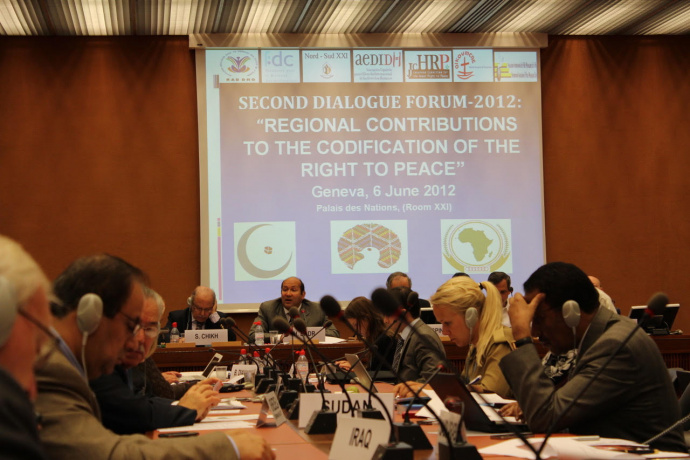
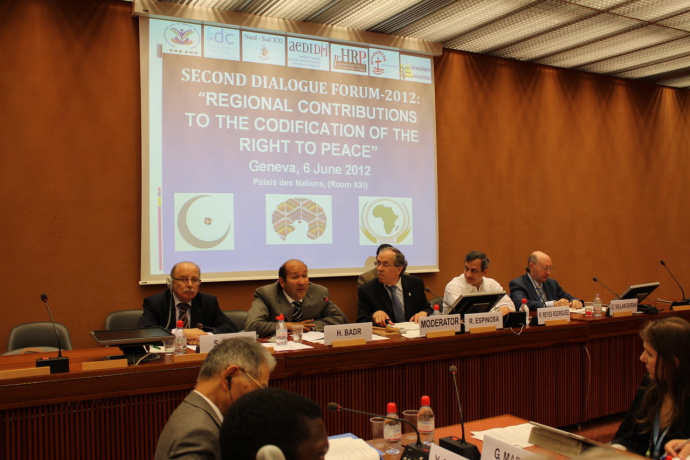
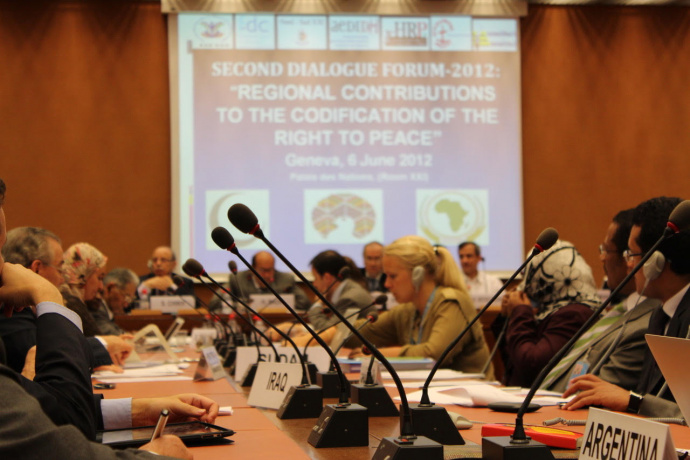
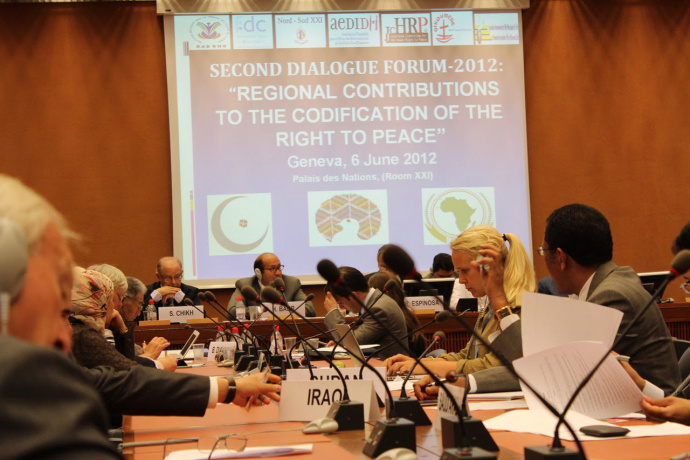
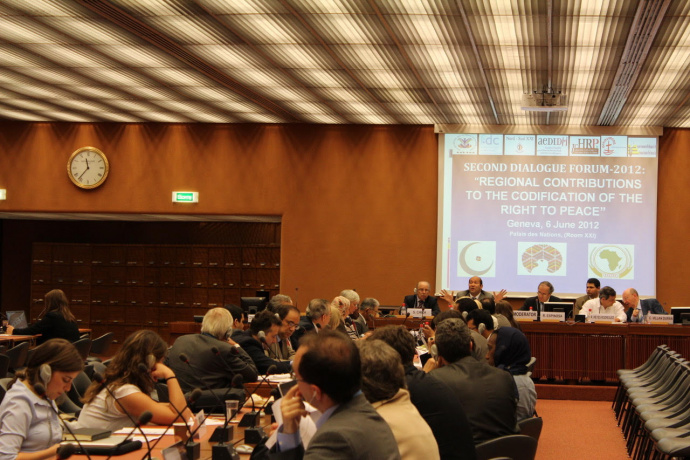
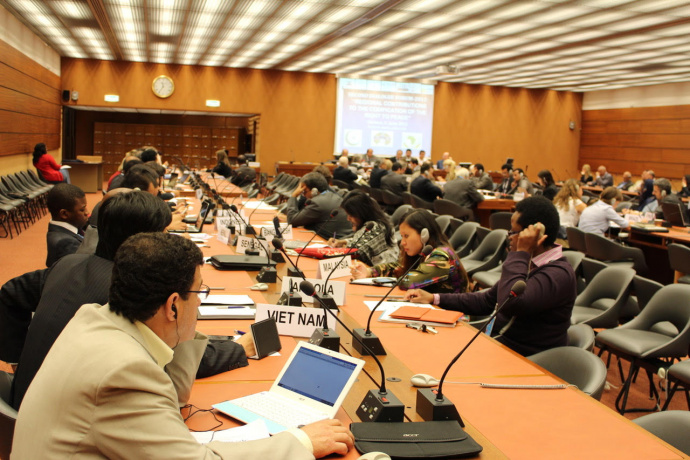
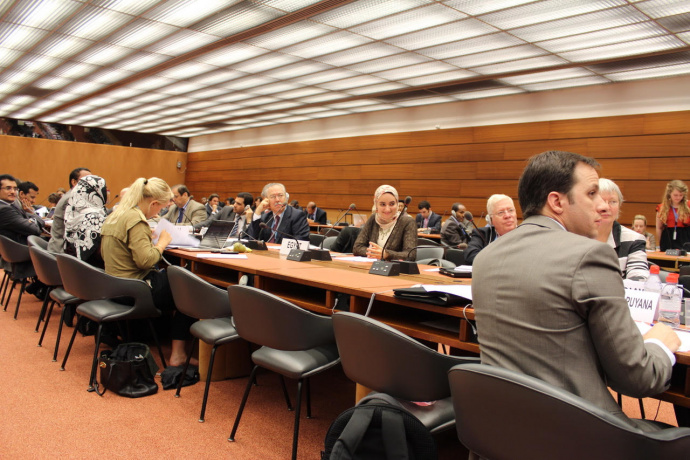
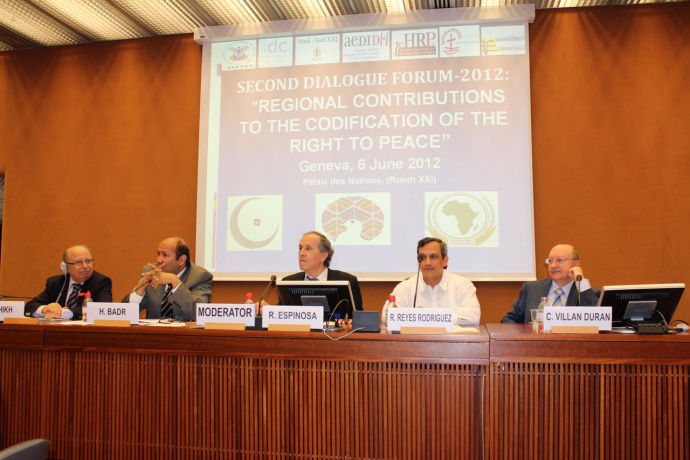








Your Comment :